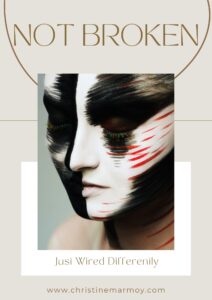I step into a bustling train station, and a wall of sound hits me. Fluorescent lights buzz at a frequency only I can hear, and each loudspeaker announcement is jarring. My senses amplify everything—clothing feels like sandpaper against my skin, smells intermingle into an overwhelming cloud and the cacophony of chatter and footsteps pounds in my ears.
The world is often too loud, too bright, too much. While others rush by unfazed, I’m fighting a tide of sensory overload. In these moments, I feel like a fragile wire in a world of thick ropes, straining not to fray under the pressure.
Alone in the Crowd
In a crowded room, everyone else seems to flow effortlessly through conversation and small talk while I linger at the edges, unsure how to join in. Social norms can feel like an intricate dance whose steps I haven’t been taught. I watch friends exchange glances or inside jokes that I don’t catch until it’s too late.
Anxiety flutters through me as I rehearse what to say, hoping my words sound “normal.” I “mask” by smiling and nodding at the right times to hide my confusion, but it’s exhausting. Even among friendly people, I often feel like an outsider.
The Inner World

Inside my mind is a comforting refuge – a place of vivid imagination, deep focus, and passion. I can lose myself in music or creative projects, each detail coming alive for me. The outside world may label me quiet or aloof, but internally, I experience life in high definition, analysing patterns and finding meaning in things others overlook.
There is often a gap between who I am inside and how I appear outside. Emotions that run like wild horses in my heart might only show as a flicker on my face. Living with this contrast between a vibrant inner life and a challenging outer reality is a core part of my neurodivergent experience.
Embracing Differences

Over time, I have learned that being different is not something to fix but to embrace. Yes, there are challenges—days when sensory overload leaves me drained or social missteps leave me embarrassed—but there are unique strengths as well. My attention to detail means I notice beauty and patterns others miss.
I am loyal and honest, and my passions burn brightly. Being neurodivergent has taught me empathy for anyone who feels out of place.
In a society that mainly celebrates fitting in, I have discovered the power of authenticity. I no longer measure myself against what is “normal.” Instead, I cherish the things that make me, well, me. Each sensory sensitivity, quirky interest, and unconventional thought is a thread in the tapestry of who I am.
As I weave my path forward, I carry a hopeful truth: there is a place for all of us. Different minds make the world more colourful and interesting. In embracing my neurodivergence, I am finally learning I belong—not despite being different but because of it.






 “Get Your Free Ebook: NOT BROKEN”
“Get Your Free Ebook: NOT BROKEN”